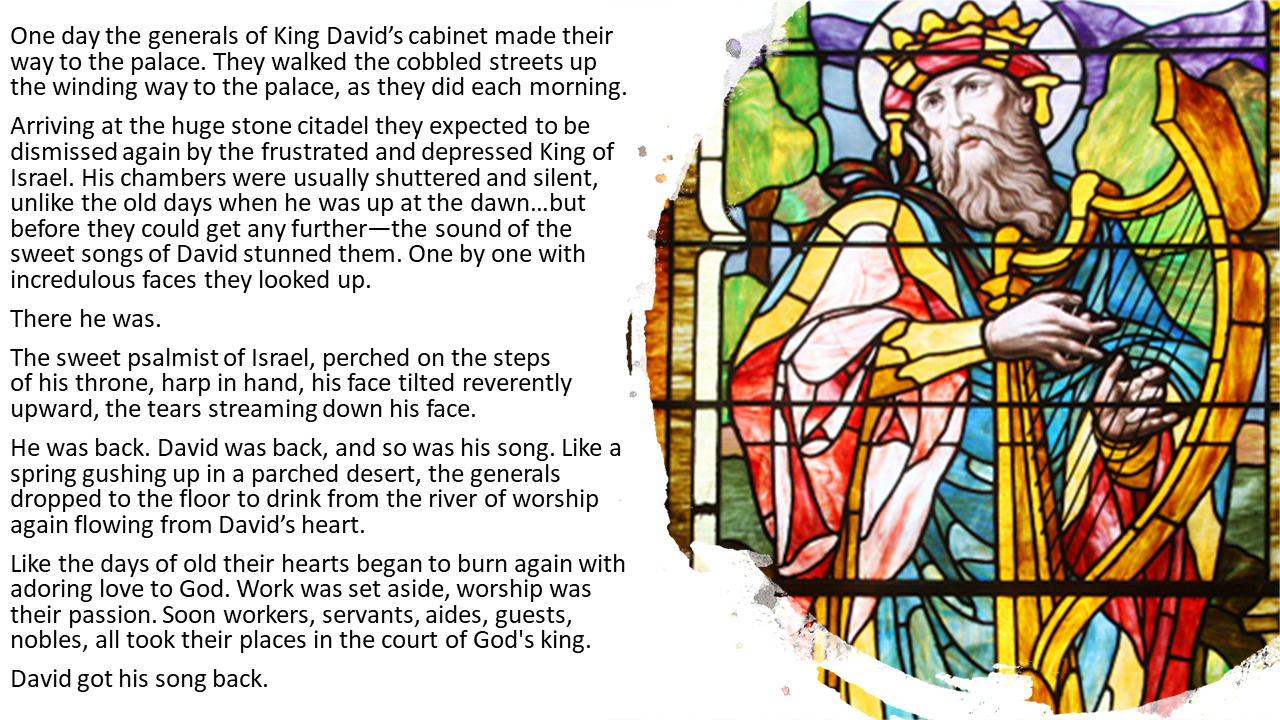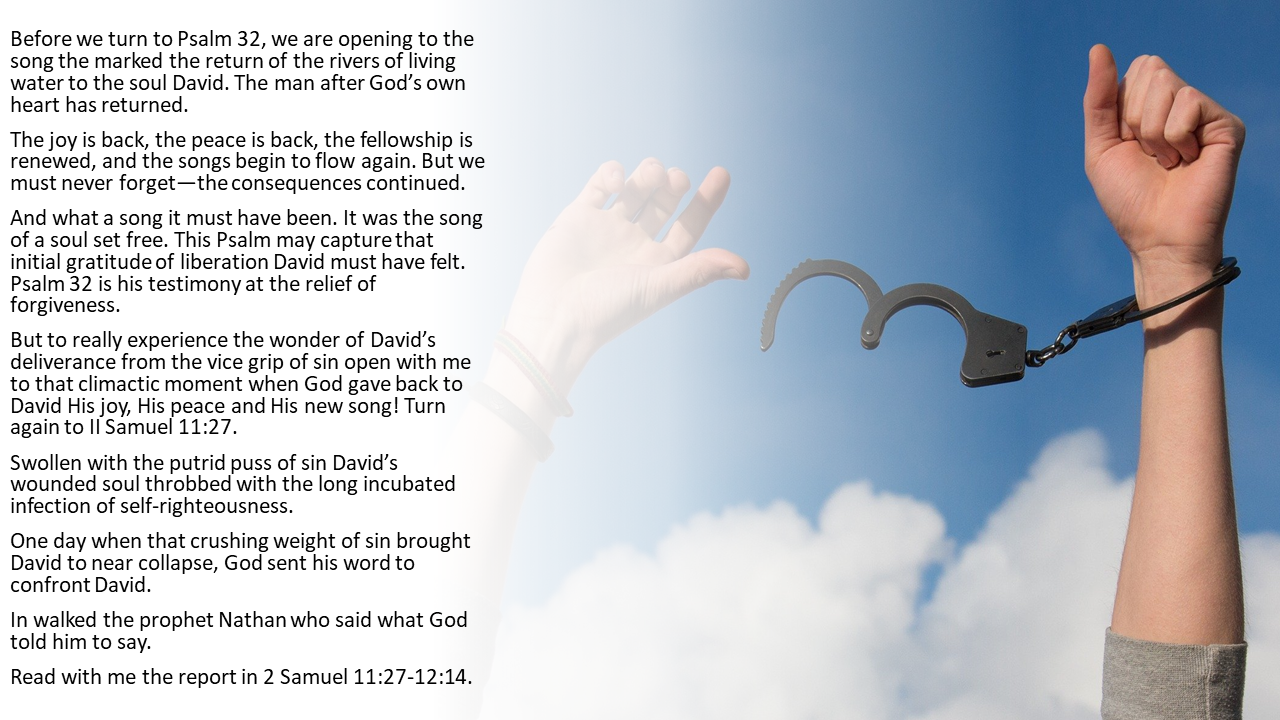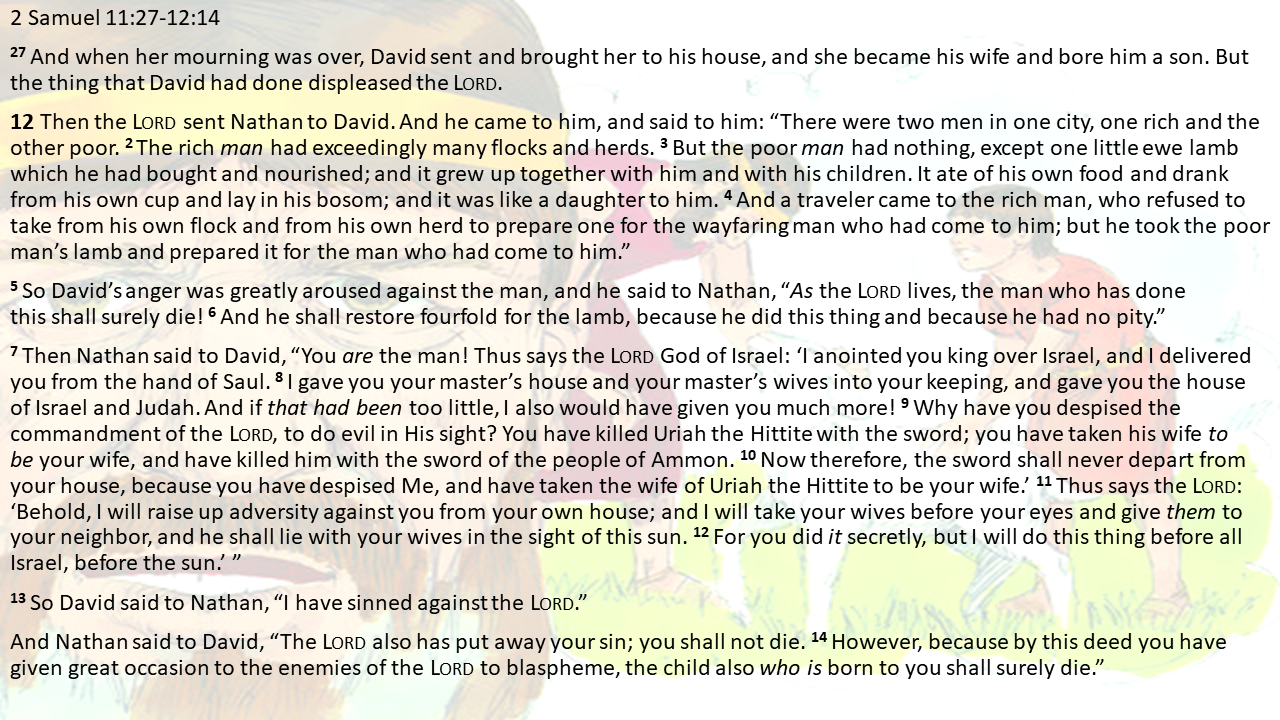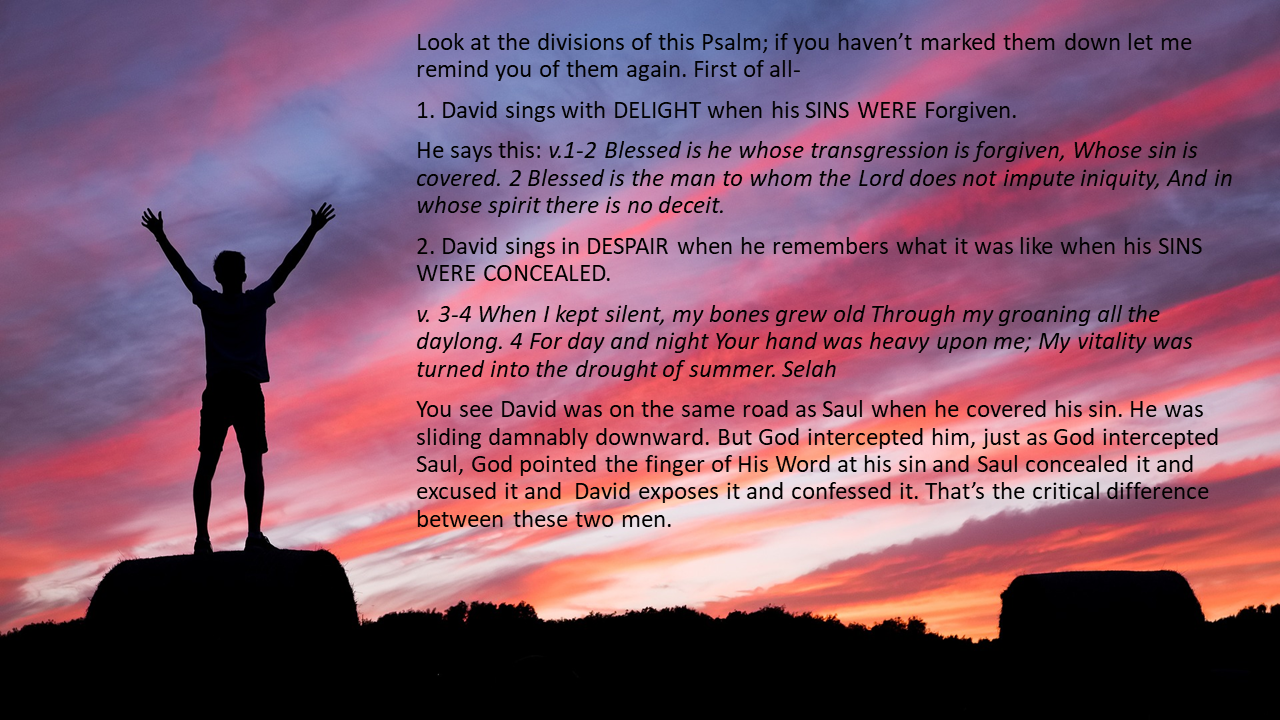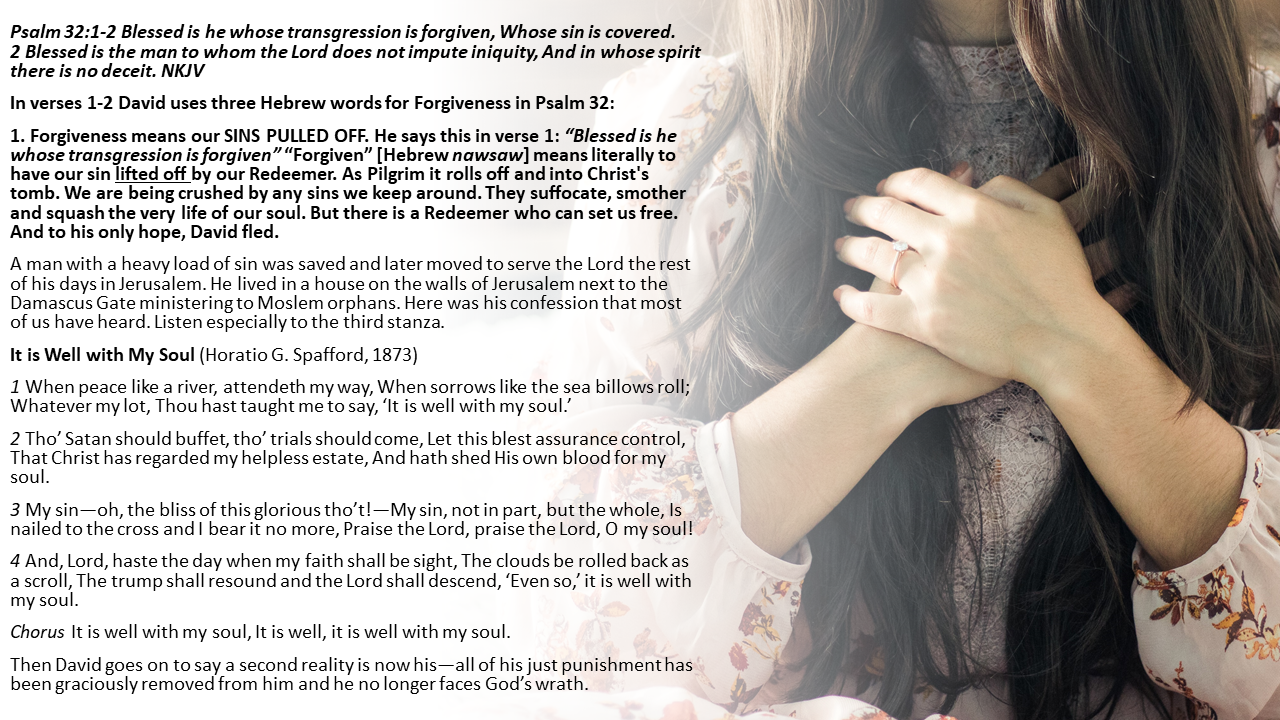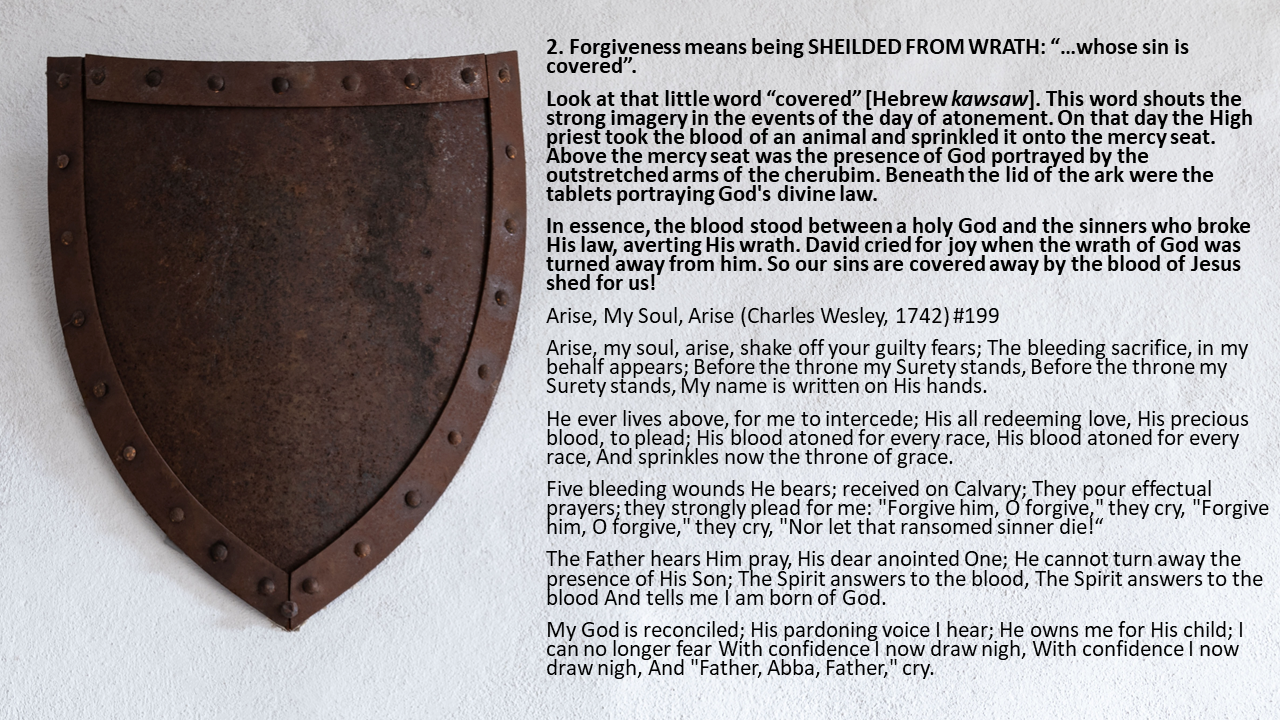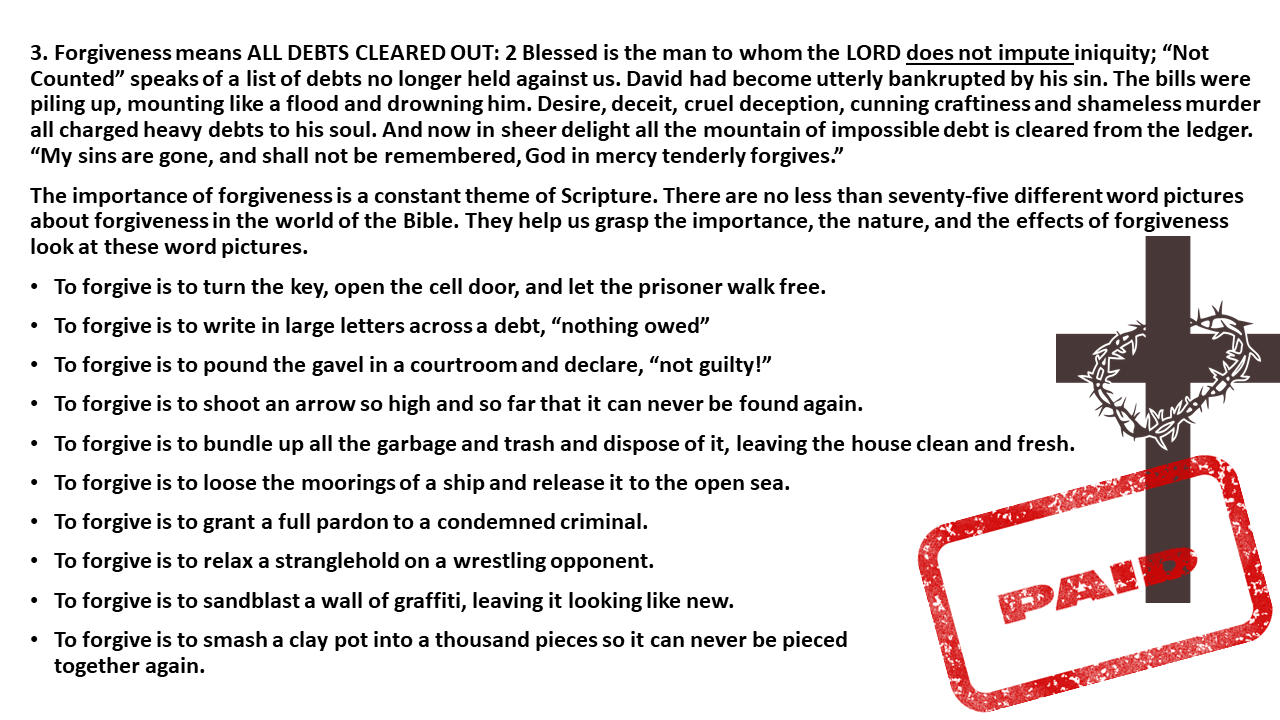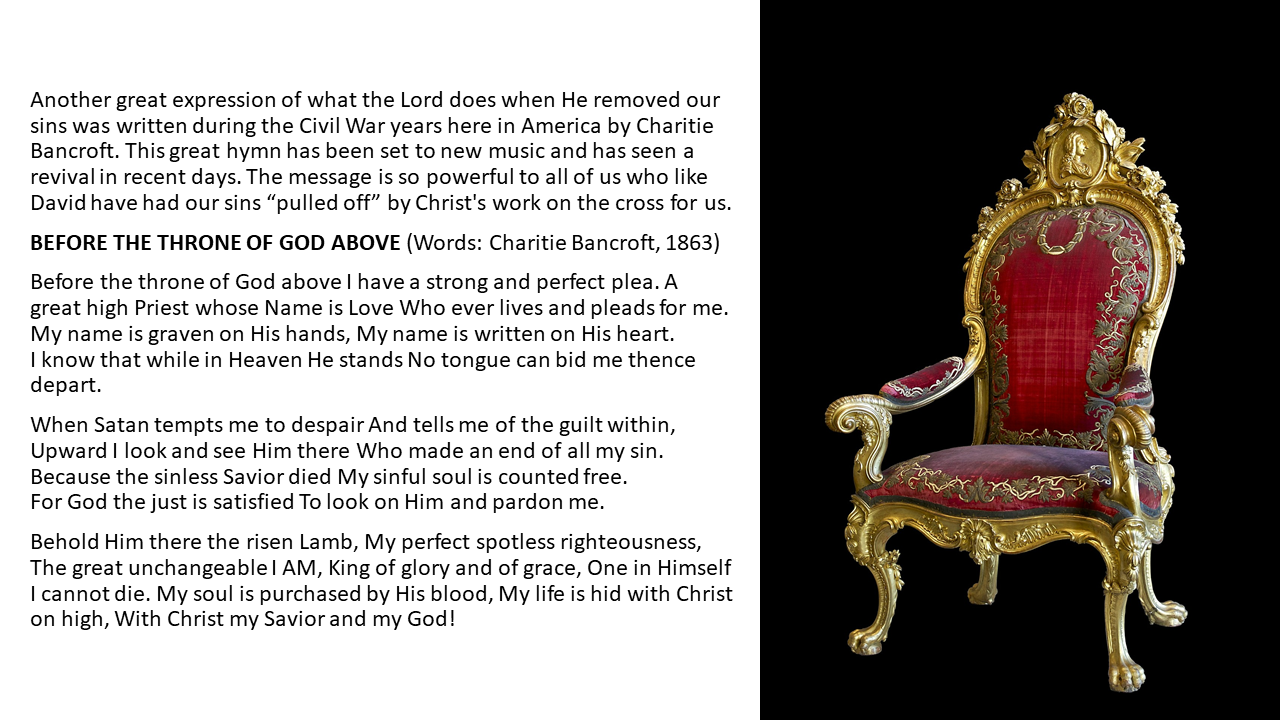If the YouTube video above is not available, here are two other ways to view:
The Song of a Soul Set Free
060625PM
DSS-22
PSALM 32
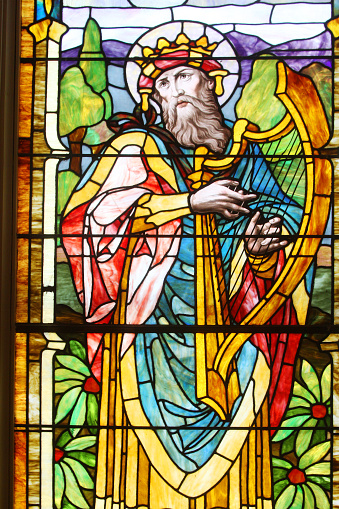 One day the generals of King David’s cabinet made their way to the palace. They walked the cobbled streets up the winding way to the palace, as they did each morning.
One day the generals of King David’s cabinet made their way to the palace. They walked the cobbled streets up the winding way to the palace, as they did each morning.
Arriving at the huge stone citadel they expected to be dismissed again by the frustrated and depressed King of Israel. His chambers were usually shuttered and silent, unlike the old days when he was up at the dawn . . . but before they could get any further—the sound of the sweet songs of David stunned them. One by one with incredulous faces they looked up.
There he was.
The sweet psalmist of Israel, perched on the steps of his throne, harp in hand, his face tilted reverently upward, the tears streaming down his face.
He was back. David was back, and so was his song.
Like a spring gushing up in a parched desert, the generals dropped to the floor to drink from the river of worship again flowing from David’s heart.
Like the days of old their hearts began to burn again with adoring love to God.
Work was set aside, worship was their passion. Soon workers, servants, aides, guests, nobles, all took their places in the court of God’s king.
David got his song back.
God has told us that when He moves to live within us by His Spirit—outward evidences will begin to be seen. Paul describes one of those evidences twice in his epistles to the church. Please open there with me to Ephesians 5.
Ephesians 5:19 speaking to one another in psalms and hymns and spiritual songs, singing and making melody in your heart to the Lord, NKJV
Colossians 3:16 Let the word of Christ dwell in you richly in all wisdom, teaching and admonishing one another in psalms and hymns and spiritual songs, singing with grace in your hearts to the Lord. NKJV
Wonderful as the Spirit flowing through us may be, when grieved or quenched—the spring of our soul and the song that results, dries up.
Ephesians 4:30 And do not grieve the Holy Spirit of God, by whom you were sealed for the day of redemption. NKJV
1 Thessalonians 5:19 Do not quench the Spirit. NKJV
That is what we saw happened when David was hiding his sin. The consequence David experienced because of the Lord’s displeasure at his sin in II Samuel 11:27 was that he lost his song. God was grieved with David’s sin. The Spirit of God was quenched, snuffed out and doused with the deadening effects of David’s sin.
But David’s heart, touched by God’s grace—responds with confession and repentance.
Before we turn to Psalm 32, we are opening to the song the marked the return of the rivers of living water to the soul David. The man after God’s own heart has returned. The joy is back, the peace is back, the fellowship is renewed, and the songs begin to flow again. But we must never forget—the consequences continued.
And what a song it must have been. It was the song of a soul set free. This Psalm may capture that initial gratitude of liberation David must have felt. Psalm 32 is his testimony at the relief of forgiveness.
But to really experience the wonder of David’s deliverance from the vice grip of sin open with me to that climactic moment when God gave back to David His joy, His peace and His new song! Turn again to II Samuel 11:27.
Swollen with the putrid puss of sin David’s wounded soul throbbed with the long incubated infection of self-righteousness.
One day when that crushing weight of sin brought David to near collapse, God sent his word to confront David.
In walked the prophet Nathan who said what God told him to say.
Read with me the report in 2 Samuel 11:27-12:14.
Read, pray.
What a horrible thing sin is.
It deceives with all those glittering promises.
It destroys with deadly accuracy.
 When you have been defeated David is inspired of God to tell us steps we can take to come back to God.
When you have been defeated David is inspired of God to tell us steps we can take to come back to God.
Let’s look at what happens when David confessed and forsook his sins the way God wanted him to. This is what will happen in our lives when we look at sin the way God wants us to look at sin. That record is in Psalm 32 our focus for this message.
David has just repented of the horrible pit of sin he had been covering up for weeks and months. That is where we find him in Psalm 32. He writes the song about what it means to return to God and receive and experience and to possess His forgiveness- “The Song of a soul set free”
Look at the divisions of this Psalm; if you haven’t marked them down let me remind you of them again. First of all-
1. David sings with DELIGHT when his SINS WERE Forgiven. He says this:
v.1-2 Blessed is he whose transgression is forgiven, Whose sin is covered. 2 Blessed is the man to whom the Lord does not impute iniquity, And in whose spirit there is no deceit.
2. David sings in DESPAIR when he remembers what it was like when his SINS WERE CONCEALED.
v. 3-4 When I kept silent, my bones grew old Through my groaning all the daylong. 4 For day and night Your hand was heavy upon me; My vitality was turned into the drought of summer. Selah
You see David was on the same road as Saul when he covered his sin. He was sliding damnably downward. But God intercepted him, just as God intercepted Saul, God pointed the finger of His Word at his sin and Saul concealed it and excused it and David exposes it and confessed it. That’s the critical difference between these two men.
3. David sings of DELIVERANCE. He delighted that his sins were cleansed. He despaired when they were concealed. But he was delivered when his SINS WERE CONFESSED.
v.5-7 I acknowledged my sin to You, And my iniquity I have not hidden. I said, “I will confess my transgressions to the Lord,” And You forgave the iniquity of my sin. Selah 6 For this cause everyone who is godly shall pray to You In a time when You may be found; Surely in a flood of great waters They shall not come near him. 7 You are my hiding place; You shall preserve me from trouble; You shall surround me with songs of deliverance. Selah
That’s why 1 John says a characteristic of a truly born again person is that they are confessing their sins. They are constantly agreeing with God, constantly exposing themselves to God’s holy sight and saying–God before you I am naked and open. You can see me and I confess my sinfulness.
When we do that, when we don’t cover it, we can prosper. But when we cover our sins—you know God sees them when we try and hide them—He says you will never prosper.
4. David sings about his DESIRE that his SINFUL WAYS BE CRUSHED and that his sinful ways be abated.
v.8-11 I will instruct you and teach you in the way you should go; I will guide you with My eye. 9 Do not be like the horse or like the mule, Which have no understanding, Which must be harnessed with bit and bridle, Else they will not come near you. 10 Many sorrows shall be to the wicked; But he who trusts in the Lord, mercy shall surround him. 11 Be glad in the Lord and rejoice, you righteous; And shout for joy, all you upright in heart!
Let’s go deeper into each of these four divisions of Psalm 32. Maybe it will encourage you to spend a lot of time in it.
THE DELIGHT OF SINS FORGIVEN
Psalm 32:1-2 Blessed is he whose transgression is forgiven, Whose sin is covered. 2 Blessed is the man to whom the Lord does not impute iniquity, And in whose spirit there is no deceit. NKJV
In verses 1-2 David uses three Hebrew words for Forgiveness in Psalm 32:
1. Forgiveness means our SINS PULLED OFF. He says this in verse 1:
“Blessed is he whose transgression is forgiven”
“Forgiven” [Hebrew nawsaw] means literally to have our sin lifted off by our Redeemer. As Pilgrim it rolls off and into Christ’s tomb. We are being crushed by any sins we keep around. They suffocate, smother and squash the very life of our soul. But there is a Redeemer who can set us free. And to his only hope, David fled.
A man with a heavy load of sin was saved and later moved to serve the Lord the rest of his days in Jerusalem. He lived in a house on the walls of Jerusalem next to the Damascus Gate ministering to Moslem orphans. Here was his confession that most of us have heard. Listen especially to the third stanza.
 It is Well with My Soul (Horatio G. Spafford, 1873)
It is Well with My Soul (Horatio G. Spafford, 1873)
1 When peace like a river, attendeth my way, When sorrows like the sea billows roll; Whatever my lot, Thou hast taught me to say, ‘It is well with my soul.’ 2 Tho’ Satan should buffet, tho’ trials should come, Let this blest assurance control, That Christ has regarded my helpless estate, And hath shed His own blood for my soul. 3 My sin—oh, the bliss of this glorious tho’t!— My sin, not in part, but the whole, Is nailed to the cross and I bear it no more, Praise the Lord, praise the Lord, O my soul! 4 And, Lord, haste the day when my faith shall be sight, The clouds be rolled back as a scroll, The trump shall resound and the Lord shall descend, ‘Even so,’ it is well with my soul.
Chorus It is well with my soul, It is well, it is well with my soul.
Then David goes on to say a second reality is now his—all of his just punishment has been graciously removed from him and he no longer faces God’s wrath.
2. Forgiveness means being SHEILDED FROM WRATH:
“…whose sin is covered”.
Look at that little word “covered” [Hebrew kawsaw]. This word shouts the strong imagery in the events of the day of atonement.
On that day the High priest took the blood of an animal and sprinkled it onto the mercy seat. Above the mercy seat was the presence of God portrayed by the outstretched arms of the cherubim. Beneath the lid of the ark were the tablets portraying God’s divine law.
In essence, the blood stood between a holy God and the sinners who broke His law, averting His wrath. David cried for joy when the wrath of God was turned away from him. So our sins are covered away by the blood of Jesus shed for us!
Arise, My Soul, Arise (Charles Wesley, 1742) #199
Arise, my soul, arise, shake off your guilty fears; The bleeding sacrifice, in my behalf appears; Before the throne my Surety stands, Before the throne my Surety stands, My name is written on His hands.
He ever lives above, for me to intercede; His all redeeming love, His precious blood, to plead; His blood atoned for every race, His blood atoned for every race, And sprinkles now the throne of grace.
Five bleeding wounds He bears; received on Calvary; They pour effectual prayers; they strongly plead for me: “Forgive him, O forgive,” they cry, “Forgive him, O forgive,” they cry, “Nor let that ransomed sinner die!”
The Father hears Him pray, His dear anointed One; He cannot turn away the presence of His Son; The Spirit answers to the blood, The Spirit answers to the blood And tells me I am born of God.
My God is reconciled; His pardoning voice I hear; He owns me for His child; I can no longer fear With confidence I now draw nigh, With confidence I now draw nigh, And “Father, Abba, Father,” cry.
3. Forgiveness means ALL DEBTS CLEARED OUT: 2Blessed is the man to whom the LORD does not impute iniquity; “Not Counted” speaks of a list of debts no longer held against us. David had become utterly bankrupted by his sin. The bills were piling up, mounting like a flood and drowning him. Desire, deceit, cruel deception, cunning craftiness and shameless murder all charged heavy debts to his soul. And now in sheer delight all the mountain of impossible debt is cleared from the ledger. “My sins are gone, and shall not be remembered, God in mercy tenderly forgives.”
The importance of forgiveness is a constant theme of Scripture. There are no less than seventy-five different word pictures about forgiveness in the world of the Bible. They help us grasp the importance, the nature, and the effects of forgiveness look at these word pictures.
• To forgive is to turn the key, open the cell door, and let the prisoner walk free.
• To forgive is to write in large letters across a debt, “nothing owed”
• To forgive is to pound the gavel in a courtroom and declare, “not guilty!”
• To forgive is to shoot an arrow so high and so far that it can never be found again.
• To forgive is to bundle up all the garbage and trash and dispose of it, leaving the house clean and fresh.
• To forgive is to loose the moorings of a ship and release it to the open sea.
• To forgive is to grant a full pardon to a condemned criminal.
• To forgive is to relax a stranglehold on a wrestling opponent.
• To forgive is to sandblast a wall of graffiti, leaving it looking like new.
• To forgive is to smash a clay pot into a thousand pieces so it can never be pieced together again.
Another great expression of what the Lord does when He removed our sins was written during the Civil War years here in America by Charitie Bancroft. This great hymn has been set to new music and has seen a revival in recent days. The message is so powerful to all of us who like David have had our sins “pulled off” by Christ’s work on the cross for us.
BEFORE THE THRONE OF GOD ABOVE (Words: Charitie Bancroft, 1863)
Before the throne of God above I have a strong and perfect plea. A great high Priest whose Name is Love Who ever lives and pleads for me. My name is graven on His hands, My name is written on His heart. I know that while in Heaven He stands No tongue can bid me thence depart. When Satan tempts me to despair And tells me of the guilt within, Upward I look and see Him there Who made an end of all my sin. Because the sinless Savior died My sinful soul is counted free. For God the just is satisfied To look on Him and pardon me.
Behold Him there the risen Lamb, My perfect spotless righteousness, The great unchangeable I AM, King of glory and of grace, One in Himself I cannot die. My soul is purchased by His blood, My life is hid with Christ on high, With Christ my Savior and my God!
David is so thankful for his sin being forgiven, he uses four different Hebrew words for sin in Psalm 32.
Sin is such an offense to God that He has to use 15 different words in the Hebrew Old Testament just to describe it. Four of them are here in David’s song. When David stole his neighbor Uriah’s little ewe lamb for his already overflowing banqueting table he defied the rules God had laid down. David now sees his life as God saw him. God was displeased with David because of these four areas of his life.
1. Resisting or defying God’s rule is sin. Transgression [Hebrew peshah]: ‘a going away’, ‘departure’, passing over a boundary, doing what is prohibited, or ‘rebellion’ against God and his authority. This is a picture of a relationship with God that is rebelled against. OUR TRANSGRESSIONS MUST BE PULLED OFF: “Forgiven” means literally to have our sin lifted off. nesui, borne away, i.e., by a vicarious sacrifice; for bearing sin, or bearing away sin, always implies this. As Pilgrim it rolls off and into Christ’s tomb. “My sin oh the bliss . . .”. We are being crushed by any sins we keep around. They suffocate, smother and squish the very life of our soul. But there is a Redeemer who can set us free. And to his only hope, David fled. God cleansed David’s Sin that smothers: now they were forgiven “Blessed is he whose transgression is forgiven”
2. Falling short of perfection or missing God’s mark is Sin. [Hebrew chattath] is same as hamartia in Greek ‘coming short’ or ‘falling short’ as in an arrow falling short. The target is God’s law and sin is missing the mark on the target. This is a picture of failing to measure up to God’s Divine Law. chataah, must be covered, kesui, hidden from the sight. It is odious and abominable, and must be put out of sight. Whose sin is covered. “Covered by God, as the ark was covered by the mercy-seat, as Noah was covered from the flood, as the Egyptians were covered by the depths of the sea. What a cover must that be which hides away forever from the sight of the all-seeing God all the filthiness of the flesh and of the spirit!” (Spurgeon) WE MUST BE SHEILDED FROM OUR SINS: “Covered” speaks of the strong imagery in the events of the day of atonement. On that day the High priest took the blood of an animal and sprinkled it onto the mercy seat. Above the mercy seat was the presence of God portrayed by the outstretched arms of the cherubim. Beneath the lid of the ark was the tablets portraying God’s divine law. In essence, the blood stood between a holy God and the sinners who broke His law, averting His wrath. David cried for joy when the wrath of God was turned away from him. So our sins are covered away by the blood of Jesus shed for us! God cleansed David’s Sin that soils: now they were covered by the cleansing blood. “Whose sin is covered”.
3. Defacing or distorting God’s image is sin. Iniquity [Hebrew hawon] means ‘corrupt’ or ‘twisted’ or ‘crooked’. This word pictures what sin does to us inside as it warps and ruins us. So it must not be reckoned to his account. THE LEDGER OF OUR WAYWARDNESS CLEARED OUT: “Not Counted” speaks of a list of debts no longer held against us. David had become utterly bankrupted by his sin. The bills were piling up, mounting like a flood and drowning him. Desire, deceit, cruel deception, cunning craftiness and shameless murder all charged heavy debts to his soul. And now in sheer delight all the mountain of impossible debt is cleared from the ledger. “My sins are gone, and shall not be remembered, God in mercy tenderly forgives.” God cleansed David’s Sin that steals: now they were not imputed to his account as debts. “2 Blessed is the man to whom the Lord does not impute iniquity” Note that the three words so often used to denote our disobedience—transgression, sin, and iniquity—are the three-headed dog at the gates of hell, but our glorious Lord has silenced its barkings forever against his own believing ones. The trinity of sin is ovecome by the Trinity of heaven. Nonimputation is of the very essence of pardon: the believer sins, but his sin is not reckoned, not accounted to him. Certain divines froth at the mouth with rage against imputed righteousness; be it ours to see our sin not imputed, and to us may there be as Paul words it, “Righteousness imputed without works.” He is blessed indeed who has a substitute to stand for him to whose account all his debts may be set down” (Spurgeon)
4. Deceiving God’s people by a life of hypocrisy is sin. David says “guile” [Hebrew remeeyaw] and he means it. He was hunted down by the Holy Spirit, haunted by his own conscience through the night watches, but haughty and “business as usual” in the daytime. DECEIVING God’s PEOPLE IS SIN. David says “guile” and he means it. He was hunted down by the Holy Spirit, haunted by his own conscience through the night watches, but haughty and “business as usual” in the daytime. Guile, remiyah. The fourth signifies fraud, deceit, guile, etc. To remove these evils, three acts are mentioned: forgiving, covering, and not imputing. Guile, remiyah, must be annihilated from the soul: In whose spirit there is no guile. God cleansed David’s Sin that slithers: now there was no guile. “And in whose spirit there is no deceit.”
The man whose transgression is forgiven; whose sin is hidden, God having cast it as a millstone into the depths of the sea; whose iniquity and perversion is not reckoned to his account; and whose guile, the deceitful and desperately wicked heart, is annihilated, being emptied of sin and filled with righteousness, is necessarily a happy man.
BY NATURE OUR GOD IS FORGIVING
The Old Testament abounds with teachings about His forgiveness.
• David declared, “For Thou, Lord, art good, and ready to forgive, and abundant in lovingkindness to all who call upon Thee” (Ps. 86:5).
• In another psalm he reminds us that God pardons all our iniquities. Psalm 103:3,12 Who forgives all your iniquities, Who heals all your diseases; 12 As far as the east is from the west, So far has He removed our transgressions from us.
• Daniel said, “To the Lord our God belong compassion and forgiveness” (Dan. 9:9).
• God described Himself to Moses as, “the Lord, the Lord God, compassionate and gracious, slow to anger, and abounding in lovingkindness and truth; who keeps lovingkindness for thousands, who forgives iniquity, transgression and sin” (Ex. 34:6–7).
• Micah extolled the Lord, saying, Micah 7:18–19 Who is a God like You, Pardoning iniquity And passing over the transgression of the remnant of His heritage? He does not retain His anger forever, Because He delights in mercy. 19 He will again have compassion on us, And will subdue our iniquities. You will cast all our sins Into the depths of the sea.
That is the essence of the gospel: God’s divine and gracious provision for the forgiveness of man’s sin. In Christ, Paul says, “we have redemption through His blood, the forgiveness of our trespasses, according to the riches of His grace” (Eph. 1:7; cf.Col. 1:14). John assures us that, “If we confess our sins, He is faithful and righteous to forgive us our sins and to cleanse us from all unrighteousness” and that our “sins are forgiven [us] for His name’s sake” (1 John 1:9; 2:12).
 No matter how severe the sin, God can forgive it. The worst conceivable sin would be to kill God’s own Son-and that while He was on earth for the very purpose of providing salvation from sin and the way to everlasting life. Nothing could possibly be more heinous, vicious, and wicked than that. And, of course, killing Him is exactly what men did to the Son of God. Yet, while hanging on the cross and about to die, Jesus prayed and affirmed the forgiving mercy available to His executioners, “Father, forgive them; for they do not know what they are doing” (Luke 23:34).
No matter how severe the sin, God can forgive it. The worst conceivable sin would be to kill God’s own Son-and that while He was on earth for the very purpose of providing salvation from sin and the way to everlasting life. Nothing could possibly be more heinous, vicious, and wicked than that. And, of course, killing Him is exactly what men did to the Son of God. Yet, while hanging on the cross and about to die, Jesus prayed and affirmed the forgiving mercy available to His executioners, “Father, forgive them; for they do not know what they are doing” (Luke 23:34).
• The degree of sin does not forfeit forgiveness, because even killing the Son of God was forgivable.
• Nor does the volume of sin end the possibility of mercy. A seventy-year-old profligate who has lived a life of debauchery, stealing, lying, profanity, blasphemy, and immorality is just as forgivable as a seven-year-old who has done nothing worse than normal childhood haughtiness.
• Nor does the particular kind of sin cancel grace. In Scripture we find God forgiving idolatry, murder, gluttony, fornication, adultery, cheating, lying, homosexuality, covenant breaking, blasphemy, drunkenness, extortion, and every other kind of sin imaginable. He forgives self-righteousness, which is the deceiving sin of thinking that one has no sin. He even forgives the sin of rejecting Christ; otherwise no one could be saved, because before salvation everyone, to some degree, is a Christ rejecter. There is no forgiveness of even the smallest sin unless it is confessed and repented of; but there is forgiveness of even the greatest sin if those divine conditions are met.
These three paragraphs are quoted from MacArthur, J. 2000. The Murder of Jesus : A study of how Jesus died. Includes index. Word Pub.: Nashville, TN
- God cleansed David’s Sin that smothers: now they were forgiven “Blessed is he whose transgression is forgiven” My sins no longer smother me.
- God cleansed David’s Sin that soils: now they were covered by the cleansing blood. “Whose sin is covered” He was no longer covered by his sin, he was covered by the Blood.
- God cleansed David’s Sin that had stolen his blessing: now they were not imputed to his account as debts. “2 Blessed is the man to whom the Lord does not impute iniquity” And finally at the end of verse 2-
- God cleansed David’s Sin that slithers: now there was no guile. “And in whose spirit there is no deceit.” God cleansed David’s sin that made him slither around in deceitfulness- he says there is no more of that. Look at verse 3-
David sang a song of DESPAIR when his SINS WERE CONCEALED.
v. 3-4 “When I kept silent, my bones grew old through my groaning all the daylong. 4For day and night Your hand was heavy upon me; My vitality was turned into the drought of summer. Selah
David’s Concealed sin sickened him “v. 3 When I kept silent, my bones grew old” Now that’s a Biblical concept. Sin sickens Christians. Sin- God’s chastisement- sickens Christians. Every time you get sick doesn’t mean you have committed a specific sin. All sickness and decay and old age is because of the curse. I was reading an article in Time Magazine about the great mysteries of the world. They said aging is a great mystery. At the age of 30, our DNA starts replicating in a little program that doesn’t let the enzyme production continue at such a way as to utterly renew our body. Actually at the age of 30 we start dying. You have heard that you start dying from birth- actually, genetically in the protein and enzyme production it is at the age of 30- there is a genetic snap and we start going down. Now I really feel old because I am past 30! But you know he says that sin will sicken us. Scientists don’t understand why it does that- if we could get in there and tinker around we could live forever. Our bodies wouldn’t wear out, we would just go in there and we would change that and what they don’t realize is that that’s sin, the Fall, the Curse makes us decline and degenerate. But even before 30 at any time if we will conceal our sins it sickens us.
- David’s Concealed sin saddened him “Through my groaning all the day long”
- David’s Concealed sin burdened him “4 For day and night Your hand was heavy upon me;”
- David’s Concealed sin stifled him “My vitality was turned into the drought of summer. Selah” (like sun parched brown grass when it’s 120 degrees in the desert. He says I was totally sapped. But look at verse 5-
David sang a song of DELIVERANCE when his SINS WERE CONFESSED v. 5-7
Psalm 32:5-7 I acknowledged my sin to You, And my iniquity I have not hidden. I said, “I will confess my transgressions to the Lord,” And You forgave the iniquity of my sin. 6 For this cause everyone who is godly shall pray to You In a time when You may be found; Surely in a flood of great waters They shall not come near him. 7 You are my hiding place; You shall preserve me from trouble; You shall surround me with songs of deliverance. NKJV
David took personal responsibility for the sin. Unlike Saul who we saw blamed his sin on everyone else but himself.
v.5 “I acknowledged my sin to You”
David acknowledged God’s ability to see all things and that nothing was hidden from Him. Just like Joseph who in the moment of temptation cried out to the God who saw him in Genesis 39.
v.5b “And my iniquity I have not hidden”
David acknowledged God’s desire to forgive and cleanse away his sins.
v.5c “I said, “I will confess my transgressions to the Lord,”
There were thousands of priests in Israel but he didn’t look up any priests. He said I want to talk to You, God. God wants to hear us and forgive us. Finally in verse 5 it says-
David acknowledged God’s power alone to completely remove sin .
v.5d “And You forgave the iniquity of my sin”. And he punctuates it with a Selah
David acknowledged his great opportunity, as he understood the Lord is Approachable; he says WOW, God I can come to You. You are an approachable God.
v. 6 For this cause everyone who is godly shall pray to You In a time when You may be found;”
David understood the Lord is worthy of our trust. God, when it looks like everything is just swirling around me, I can trust You.
v.6b “Surely in a flood of great waters They shall not come near him.”
Now he understood he could rest in the Lord anywhere. Isn’t that neat to be able to rest in the Lord?
v. 7 “You are my hiding place, you shall preserve me from trouble”
 Now he understood he could delight in the Lord. And he punctuates that with another Selah. He says WOW, the blessing that comes from You, O God.
Now he understood he could delight in the Lord. And he punctuates that with another Selah. He says WOW, the blessing that comes from You, O God.
v.7b “You shall surround me with songs of deliverance”.
David’s Song of DESIRE that his SINFUL WAYS BE CRUSHED v. 8-11
Psalm 32:8-11 I will instruct you and teach you in the way you should go; I will guide you with My eye. 9 Do not be like the horse or like the mule, Which have no understanding, Which must be harnessed with bit and bridle, Else they will not come near you. 10 Many sorrows shall be to the wicked; But he who trusts in the Lord, mercy shall surround him. 11 Be glad in the Lord and rejoice, you righteous; And shout for joy, all you upright in heart! NKJV
David now longs God YOU LEAD ME “I will instruct you and teach you in the way you should go; I will guide (counsel) you with My eye upon you.” David longs- he says God You lead me, I blew it, I can’t do it my self. When I was running the show I was sinning. When You run the show, you bring holiness. God You lead me.
David now longs God YOU GUARD ME “v. 9 Do not be like the horse or like the mule, Which have no understanding, Which must be harnessed with bit and bridle, Else they will not come near you.” Guard me, God. I don’t want to be hard and stubborn and rebellious. Guard me from that. He continues- he says teach me–
David now longs God YOU TEACH ME “v. 10 Many sorrows shall be to the wicked;” Teach me that when sin looks alluring— Allan Petersen wrote an interesting book called the Myth of The Greener Grass. It was a book that chronicled key Christians in the last 50 years who had given up the power of God and the blessing of God in their ministry in order to go off to the greener grass. You know, it is just tragic to hear about another man who is willing to give up the blessings of God, the power of God, the intimacy with God to pursue a fleeting pleasure that lasts for a moment if that long. The book of Proverbs 20:17 says: But afterward his mouth will be filled with gravel. Proverbs 9:17 says-17″Stolen water is sweet, and bread eaten in secret is pleasant.” Sin gives pleasure for an instant. Don’t let anybody tell you that sin isn’t fun but it’s only fun for a moment then the venom and the dregs and the poison of guilt and remorse and destroyed lives follow. David says teach me, remind me that sorrows will be to the wicked. Continuing in verse 10-
David now longs God YOU SURROUND ME “But he who trusts in the Lord, mercy shall surround him.” He says Lord, I am not sure I can make it alone, surround me like the bodyguards around the President. I can still remember the pictures of the attempted assassination of Ronald Reagan. Remember how those Secret Service men just dove on him? They tackled him, they surrounded him. And if fallen, sinful humans will have that great of a desire to protect someone, God says I want to surround you. I want to clothe you with Christ (Romans 13:14- But put on the Lord Jesus Christ) I want you to put on Christ, I want you to put on My armor. I am going to surround you, I am going to guard you.
David now longs God YOU FILL ME “v. 11 Be glad in the Lord and rejoice, you righteous; And shout for joy, all you upright in heart!” You know, that is what God will do when we sin.
David nicely summarizes this Psalm with the use of an emphasis word SELAH. In today’s language it mean, “Hey, look at this!”
Psalm 32:1-11 A Psalm of David. A Contemplation.
Psalm 32:1-4 Blessed is he whose transgression is forgiven, Whose sin is covered. Blessed is the man to whom the Lord does not impute iniquity, And in whose spirit there is no deceit. When I kept silent, my bones grew old through my groaning all the day long. For day and night Your hand was heavy upon me; my vitality was turned into the drought of summer. Selah [God convicted me]
Psalm 32:5 I acknowledged my sin to You, and my iniquity I have not hidden. I said, “I will confess my transgressions to the Lord,” and You forgave the iniquity of my sin. Selah [God heard my confession]
Psalm 32:6-7 For this cause everyone who is godly shall pray to You In a time when You may be found; Surely in a flood of great waters They shall not come near him. You are my hiding place; You shall preserve me from trouble; You shall surround me with songs of deliverance. Selah [God offers me refuge]
Psalm 32:8-11 I will instruct you and teach you in the way you should go; I will guide you with My eye. 9 Do not be like the horse or like the mule, Which have no understanding, Which must be harnessed with bit and bridle, Else they will not come near you. 10 Many sorrows shall be to the wicked; But he who trusts in the Lord, mercy shall surround him. 11 Be glad in the Lord and rejoice, you righteous; And shout for joy, all you upright in heart! NKJV [God will keep me]
What David experienced was #201 in your hymnbook. What Saul didn’t experience was #201 in your hymnbook. I want you to think about these words as we read them together.
Marvelous grace of our loving Lord, Grace that exceeds our sin and our guilt! Yonder on Calvary’s mount outpoured, There where the blood of the Lamb was spilt.
Sin and despair, like the sea waves cold, Threaten the soul with infinite loss; Grace that is greater, yes, grace untold, Points to the refuge, the mighty cross.
Dark is the stain that we cannot hide. What can avail to wash it away? Look! There is flowing a crimson tide, Brighter than snow you may be today.
Marvelous, infinite, matchless grace, Freely bestowed on all who believe! You that are longing to see his face, Will you this moment his grace receive?
Refrain: Grace, grace, God’s grace, Grace that will pardon and cleanse within; Grace, grace, God’s grace, Grace that is greater than all our (MY) sin!
Slides
Check Out All The Sermons In The Series
You can find all the sermons and short clips from this series, David’s Spiritual Secret here.
Looking To Study The Bible Like Dr. Barnett?
Dr. Barnett has curated an Amazon page with a large collection of resources he uses in his study of God’s Word. You can check it out here.



